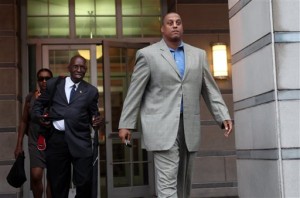Former Milwaukee Buck to argue for conviction reversal
By: Associated Press//October 31, 2014//

TRENTON, N.J. (AP) — A former NBA player convicted in a real estate Ponzi scheme is due in court to argue for a new trial.
Tate George has accused the government of prosecutorial misconduct. He is scheduled to appear in court in Trenton on Friday morning.
George was convicted last fall on four mail fraud counts. He has been jailed since his conviction and was denied bail earlier this week.
George starred for the University of Connecticut and later played for the New Jersey Nets and the Milwaukee Bucks.
The U.S. attorney’s office contends George persuaded pro athletes and other victims to invest in a purported real estate opportunity. Prosecutors say instead of buying the real estate he’d touted he used the money to pay off earlier investors and cover personal expenses.
Wire fraud carries a maximum 20-year sentence upon conviction, but defendants rarely receive the maximum. Because George had no previous criminal history, his sentence under federal guidelines likely would depend largely on the total monetary loss to his victims, and that amount has been hotly disputed by the two sides.
In a motion filed last month, George called the government’s case “as porous as Swiss cheese” and claimed prosecutors conceded in a phone conference that the real estate projects at issue were legitimate. George said he dealt with investors in good faith and never operated a Ponzi scheme, which he said can be proved by testimony from his corporate attorney, who wasn’t called to testify by the attorney who defended George at trial.
Legal News
- State Bar leaders remain deeply divided over special purpose trust
- Former Wisconsin college chancellor fired over porn career is fighting to keep his faculty post
- Pecker says he pledged to be Trump campaign’s ‘eyes and ears’ during 2016 race
- A conservative quest to limit diversity programs gains momentum in states
- Wisconsin prison inmate pleads not guilty to killing cellmate
- Waukesha man sentenced to 30 years for Sex Trafficking
- 12-year-old shot in Milwaukee Wednesday with ‘serious injuries’
- Milwaukee man convicted of laundering proceeds of business email compromise fraud schemes
- Giuliani, Meadows among 18 indicted in Arizona fake electors case
- Some State Bar diversity participants walk away from program
- Wisconsin court issues arrest warrant ‘in error’ for Minocqua Brewing owner
- Iranian nationals charged cyber campaign targeting U.S. Companies
WLJ People
- Power 30 Personal Injury Attorneys – Russell Nicolet
- Power 30 Personal Injury Attorneys – Benjamin Nicolet
- Power 30 Personal Injury Attorneys – Dustin T. Woehl
- Power 30 Personal Injury Attorneys – Katherine Metzger
- Power 30 Personal Injury Attorneys – Joseph Ryan
- Power 30 Personal Injury Attorneys – James M. Ryan
- Power 30 Personal Injury Attorneys – Dana Wachs
- Power 30 Personal Injury Attorneys – Mark L. Thomsen
- Power 30 Personal Injury Attorneys – Matthew Lein
- Power 30 Personal Injury Attorneys – Jeffrey A. Pitman
- Power 30 Personal Injury Attorneys – William Pemberton
- Power 30 Personal Injury Attorneys – Howard S. Sicula











